Inyi Ancestral History
In many town Legends and folklores, a certain man sires children, who beget the villages. The rest is a matter of who has the most convincing story. Inyi is no exception. It is agreed that the man Inyi begot many sons.
They are Ome, Enugu, Obune, Amankwo, Agbalidi, and the founders of Alum, Umuagu, Nkwere and Akwu.
As in such stories, these sons married and had children who founded towns; the sons of the children founded the villages. Some stories sometimes go off the tangent; others tow the well-known path in Igbo mythology.
Somewhere along the line, we get back to the same basic conclusion: We are all brethren in humanity.
The fact remains that no one knows exactly who first inhabited a particular part of any town.
In most parts of Igboland, original populations have survived with such names as “Nwainyi” and "Umuala" (sons of the soil).
They are Ome, Enugu, Obune, Amankwo, Agbalidi, and the founders of Alum, Umuagu, Nkwere and Akwu.
As in such stories, these sons married and had children who founded towns; the sons of the children founded the villages. Some stories sometimes go off the tangent; others tow the well-known path in Igbo mythology.
Somewhere along the line, we get back to the same basic conclusion: We are all brethren in humanity.
The fact remains that no one knows exactly who first inhabited a particular part of any town.
In most parts of Igboland, original populations have survived with such names as “Nwainyi” and "Umuala" (sons of the soil).
Pre-Historic Inyi
Inyi lived with his Nkwere foster father until he became a fully-grown young man past the age of puberty. Then adversity struck. Inyi was convicted of sleeping with Ajadu (a woman still in mourning period who had not completed the Iru ekpe rites for her dead husband). And Inyi had been a secret lover of the woman before the death of her husband. It was declared that Inyi committed aru (abomination). Inyi was banished from Nkwere according to the custom at the time. Moving into the unknown, Inyi then moved far away from Nkwere and avoided Alaike and Aguezi so as not to encounter Nkwere farmers.
As Inyi continued wandering away, he found a farm, of which he thanked his creator for leading him in that direction. He settled under an Inyi tree, some distance from the farm. The following day he came near the farm and hid to observe the owner of the farm. After observing the people who work in the farm, he had mastered the routine of the owner of the farm. Before the food he brought from Nkwere finished, he scouted around and found a stream for source of water. Thereafter, he began to take crops from the farm for his sustenance.
After some time, the owner of the farm noticed that his crops were missing in a steady rate. One day after working in his farm, he pretended to go home, but hid in ambush in an attempt to discover why his crops were missing. When Inyi came and began to take some crops, the farmer saw who was stealing his crops. He accosted Inyi and asked him where he came from. Inyi apologized and pleaded that he had no choice but to take some crops for his survival.
Inyi took the owner of the farm to his settlement under
the inyi tree.
The farmer pitied him, after a long discussion, the farmer
told him that whatever names he might have answered in
the past, he would call him “ INYI ” from then on, as he found
him sheltering under an inyi tree.
That was how the young man associated with two abominations acquired the name “INYI”. In like manner, Inyi told the farmer that whatever his family name might be, he (Inyi) would henceforth be calling the farmer " JI-ALA " (the owner or the holder of the land) because he found him to be the owner and cultivator of the farm that kept him (Inyi) alive.
As Inyi continued wandering away, he found a farm, of which he thanked his creator for leading him in that direction. He settled under an Inyi tree, some distance from the farm. The following day he came near the farm and hid to observe the owner of the farm. After observing the people who work in the farm, he had mastered the routine of the owner of the farm. Before the food he brought from Nkwere finished, he scouted around and found a stream for source of water. Thereafter, he began to take crops from the farm for his sustenance.
After some time, the owner of the farm noticed that his crops were missing in a steady rate. One day after working in his farm, he pretended to go home, but hid in ambush in an attempt to discover why his crops were missing. When Inyi came and began to take some crops, the farmer saw who was stealing his crops. He accosted Inyi and asked him where he came from. Inyi apologized and pleaded that he had no choice but to take some crops for his survival.
Inyi took the owner of the farm to his settlement under
the inyi tree.
The farmer pitied him, after a long discussion, the farmer
told him that whatever names he might have answered in
the past, he would call him “ INYI ” from then on, as he found
him sheltering under an inyi tree.
That was how the young man associated with two abominations acquired the name “INYI”. In like manner, Inyi told the farmer that whatever his family name might be, he (Inyi) would henceforth be calling the farmer " JI-ALA " (the owner or the holder of the land) because he found him to be the owner and cultivator of the farm that kept him (Inyi) alive.

Oji River Local Government Area, Enugu State, Nigeria
Jiala took Inyi home and they lived in harmony. Inyi worked hard and soon built his own house with the help of Jiala. Inyi was a handsome and talented young man. The strength of character that enabled him to bring home the handful of live erughereru helped him to excel in most of his endeavours. He was a constant winner in village games. Therefore, he was a hot choice in the selection of the two groups to oppose each other in the village games.
He was fantastic in wrestling and always won his wrestling matches. In the competition for making yam mounds he always won the chicken head, which was the symbolic prize for completing his line of yam mounds before all others. He excelled in running races as well as in dancing.
In the harvesting season, young men competed in carrying heavy baskets of harvested yams from the farm to the barn at home, and Inyi often returned the heaviest baskets of harvested yams. He was also fast acquiring a larger yam barn than his age mates.
This soon earned him recognition as INYI OMIRE (of great prowess).
However, Inyi eventually married one of the village girls called Ukagbantu (meaning if tales are false, truth prevails).
They had five sons: Ome, Enugu, Obune, Amankwo, Agbaliji.
As the five sons of Inyi grew into manhood, they exhibited the character inherited from their father. In particular, they excelled in their indeavours like their father Inyi. They became renowned for their prowess. Accordingly, they acquired recognition as umuinyi nese omire (five Inyi sons of great prowess).
As the ages passed by, this saying got slightly modified to Inyi nese omire. That was the origin of the saying “ INYI NESE OMIRE .......... ” we hear in our time.
In the circumstances, all the descendants of Inyi multiplied and expanded out beyond the original lands Inyi occupied. Agbalidi had an unmarried daughter that procreated Alum.
Which gave rise to the saying that “Agbaliji na Alum bu nwanne” (Agbaliji and Alum are relatives).
When the origins of the other Inyi towns, namely Umuagu, Nkwere and Akwu were raised is more unclear. But it is agreed that the progenitor of Umuagu was picked where he was abandoned in the bush near the boundary of Inyi and Achi probably because of some abomination as in the case of Inyi. It is also agreed that Nkwere and Akwu originated from small groups that migrated from Nkwere Ubaha and Akwu Achi.
The current makeup of Inyi town are as followed
Umuome,
Enugu,
Obune,
Amankwo,
Agbaliji,
Umuagu,
Alum,
Nkwere,
and Akwu.
He was fantastic in wrestling and always won his wrestling matches. In the competition for making yam mounds he always won the chicken head, which was the symbolic prize for completing his line of yam mounds before all others. He excelled in running races as well as in dancing.
In the harvesting season, young men competed in carrying heavy baskets of harvested yams from the farm to the barn at home, and Inyi often returned the heaviest baskets of harvested yams. He was also fast acquiring a larger yam barn than his age mates.
This soon earned him recognition as INYI OMIRE (of great prowess).
However, Inyi eventually married one of the village girls called Ukagbantu (meaning if tales are false, truth prevails).
They had five sons: Ome, Enugu, Obune, Amankwo, Agbaliji.
As the five sons of Inyi grew into manhood, they exhibited the character inherited from their father. In particular, they excelled in their indeavours like their father Inyi. They became renowned for their prowess. Accordingly, they acquired recognition as umuinyi nese omire (five Inyi sons of great prowess).
As the ages passed by, this saying got slightly modified to Inyi nese omire. That was the origin of the saying “ INYI NESE OMIRE .......... ” we hear in our time.
In the circumstances, all the descendants of Inyi multiplied and expanded out beyond the original lands Inyi occupied. Agbalidi had an unmarried daughter that procreated Alum.
Which gave rise to the saying that “Agbaliji na Alum bu nwanne” (Agbaliji and Alum are relatives).
When the origins of the other Inyi towns, namely Umuagu, Nkwere and Akwu were raised is more unclear. But it is agreed that the progenitor of Umuagu was picked where he was abandoned in the bush near the boundary of Inyi and Achi probably because of some abomination as in the case of Inyi. It is also agreed that Nkwere and Akwu originated from small groups that migrated from Nkwere Ubaha and Akwu Achi.
The current makeup of Inyi town are as followed
Umuome,
Enugu,
Obune,
Amankwo,
Agbaliji,
Umuagu,
Alum,
Nkwere,
and Akwu.
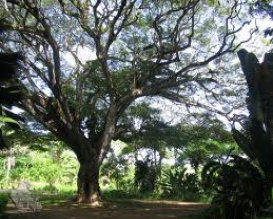
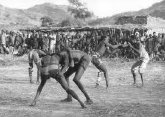
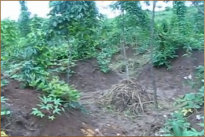
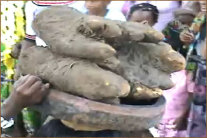
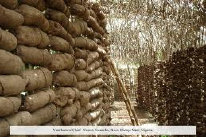

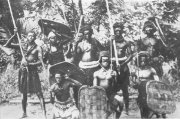
News Highlights....
|
Inyi News and Events |
Inyi Nwa-Ocho Ucho.........................
Inyi was born in Agunese near Awaaham in Umueji of Ufuma Clan. Following the custom of the time, he was abandoned in that part of Aguezi (name of a farmland), which was farmed in common by Umuogem, Umueji, Nkwere Ubaha and Enugu Inyi in our time. This part of Aguezi farmland is beyond ohwo (the waterfall on Mmam River).
Young Inyi was abandoned in the bush because, as he grew, his teeth showed on the upper jaw first before it grew on the lower jaw.
This and other birth abnormalities like normal twins, a baby coming out of the womb with legs first instead of head first, conjoined twins and many serious birth defects were regarded as aru (abominations).
Such children were abandoned in the bush to ward off further devastation of the family and the community by angry gods.
A man from Nkwere Ubaha found the young Inyi in the bush at Aguezi and took him home. He brought Inyi up along with his own children as a part of his family. Thus he became the foster father of Inyi. In those days, every attribute of wealth was labour intensive; be it crop farming, rearing of domestic animals, ownership and harvesting of oil palm trees, fruit trees, bamboo palm trees and so on. Accordingly, having many children was a measure of the capacity for amassing wealth and therefore a measure of wealth in itself. Indeed, the two were usually mentioned together as aku na uba (wealth and many).
The Nkwere man invited a juju (fetish) expert to
prepare a juju concoction that would give him many
children.
The juju expert produced a long list of ingredients
for the concoction recipe and it included live
erughereru (a kind of belligerent soldier ants), of
which each of his children must collect a handful of
live erughereru.
All the children went to collect the
solder ants, but only Inyi endured the pains of solder
ant’s bites and brought home his handful.
The other children abandoned their handfuls of ants because of the bites all over their hands. After making the concoction, the benefits of the concoction would accrue to the children and through them benefit the Nkwere man. And as it was only Inyi who brought home his handful of live erughereru, He would get the benefit of having numerous descendants
Young Inyi was abandoned in the bush because, as he grew, his teeth showed on the upper jaw first before it grew on the lower jaw.
This and other birth abnormalities like normal twins, a baby coming out of the womb with legs first instead of head first, conjoined twins and many serious birth defects were regarded as aru (abominations).
Such children were abandoned in the bush to ward off further devastation of the family and the community by angry gods.
A man from Nkwere Ubaha found the young Inyi in the bush at Aguezi and took him home. He brought Inyi up along with his own children as a part of his family. Thus he became the foster father of Inyi. In those days, every attribute of wealth was labour intensive; be it crop farming, rearing of domestic animals, ownership and harvesting of oil palm trees, fruit trees, bamboo palm trees and so on. Accordingly, having many children was a measure of the capacity for amassing wealth and therefore a measure of wealth in itself. Indeed, the two were usually mentioned together as aku na uba (wealth and many).
The Nkwere man invited a juju (fetish) expert to
prepare a juju concoction that would give him many
children.
The juju expert produced a long list of ingredients
for the concoction recipe and it included live
erughereru (a kind of belligerent soldier ants), of
which each of his children must collect a handful of
live erughereru.
All the children went to collect the
solder ants, but only Inyi endured the pains of solder
ant’s bites and brought home his handful.
The other children abandoned their handfuls of ants because of the bites all over their hands. After making the concoction, the benefits of the concoction would accrue to the children and through them benefit the Nkwere man. And as it was only Inyi who brought home his handful of live erughereru, He would get the benefit of having numerous descendants
Copyright © 2013 Inyitown.com and Inyi.co.uk - All Rights Reserved
Like our Page

